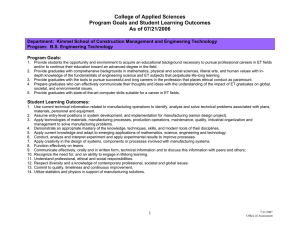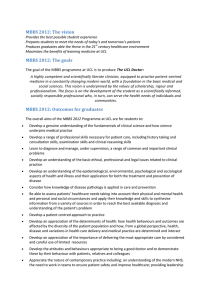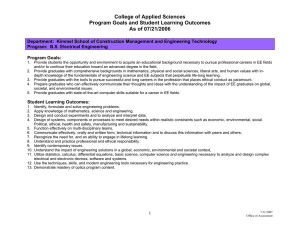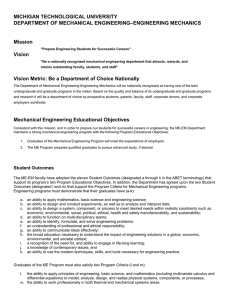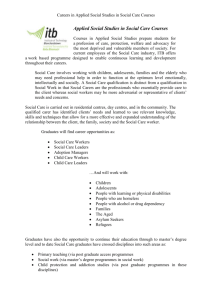2013 Medical School Annual Return (MSAR)
advertisement
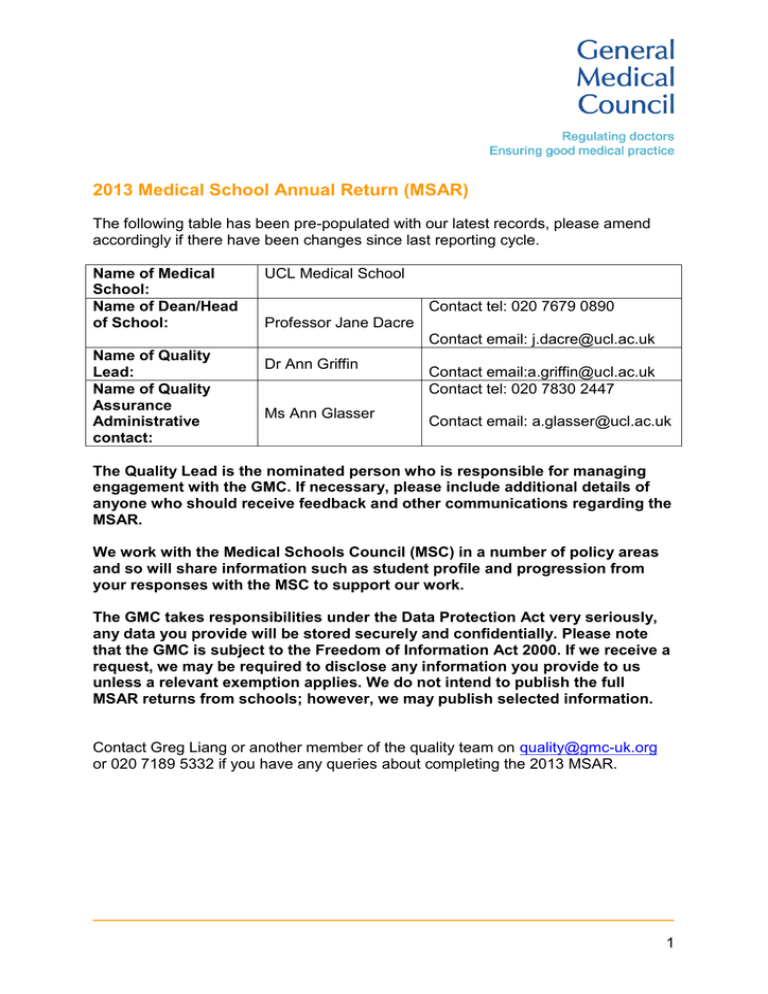
2013 Medical School Annual Return (MSAR) The following table has been pre-populated with our latest records, please amend accordingly if there have been changes since last reporting cycle. Name of Medical School: Name of Dean/Head of School: UCL Medical School Contact tel: 020 7679 0890 Professor Jane Dacre Contact email: j.dacre@ucl.ac.uk Name of Quality Lead: Name of Quality Assurance Administrative contact: Dr Ann Griffin Ms Ann Glasser Contact email:a.griffin@ucl.ac.uk Contact tel: 020 7830 2447 Contact email: a.glasser@ucl.ac.uk The Quality Lead is the nominated person who is responsible for managing engagement with the GMC. If necessary, please include additional details of anyone who should receive feedback and other communications regarding the MSAR. We work with the Medical Schools Council (MSC) in a number of policy areas and so will share information such as student profile and progression from your responses with the MSC to support our work. The GMC takes responsibilities under the Data Protection Act very seriously, any data you provide will be stored securely and confidentially. Please note that the GMC is subject to the Freedom of Information Act 2000. If we receive a request, we may be required to disclose any information you provide to us unless a relevant exemption applies. We do not intend to publish the full MSAR returns from schools; however, we may publish selected information. Contact Greg Liang or another member of the quality team on quality@gmc-uk.org or 020 7189 5332 if you have any queries about completing the 2013 MSAR. 1 MSAR 2013 – Section A Domain 1 – Patient safety 1. Did you identify any themes relating to concerns about the professionalism of your students? Have you taken any action as a result of observed trends in professionalism and/or trends in actual student fitness to practise cases? We ask you to submit this information because it helps us to identify areas of common concern between medical schools. We use this information to inform policy development and to understand the challenges schools face in this area. We would like you to show how you address common professionalism problems in your students. We may also wish to share this information between schools as good or notable practice. Concerns about professionalism and fitness to practise are uncommon and as such identifying trends is difficult. Concerns about professionalism and the use of social media has prompted UCLMS to write a guidance document for students. 2. In the last academic year have you identified any issues with clinical supervision (supervision by clinicians during clinical placements) within your Local Education Providers (LEPs) and if so what steps have you taken to resolve them? Requirement 35 of Tomorrow’s Doctors stressed the significance of student clinical supervision with regard to patient safety. Details including the nature of these issues, how you address them, subsequent evaluation or monitoring, and current status will be helpful. This information will enable us to cross-reference with information about postgraduate education where training is delivered in the same LEPs and highlight areas of potential concern. Please use the D1- Q2 sheet in the annex (Excel format). The introduction of longer more integrated placements in MBBS 2012 has required a more robust approach to clinical supervision. In years 1 & 2, each placement has a named supervisor and students are briefed by this supervisor at the beginning of the placement. In years 4-6, again the module coordinator for each site ensures a briefing at the beginning of the placement and defines how supervision and sign off will take place. Information, in the form of SLEs and in/mid/placement reviews and sign offs, that are used for the final end of module sign off are collated throughout the module by the student within the e-portfolio. This process, along with our routine student evaluation questionnaires has identified placements where supervision is robust and those where it is less so. Domain 2 – Quality assurance, review and evaluation 3. Paragraph 41 of Tomorrow’s Doctors (2009; TD09) states that medical schools will have systems to monitor the quality of teaching and facilities on placement, therefore we would like to know: 2 a. The list of quality management visits you have undertaken in the 2012/13 academic year? There have been three ‘light touch’ visits during this period to Barnet & Chase Farm Hospitals NHS Trust, Lister Hospital, East and North Herts NHS Trust, and North Middlesex University Hospital Trust. We have rolled out the Medical Education Provider Annual Return (MEPAR) during this period to all DGHs. It mirrors the GMC’s self-assessment process (MSAR) and is designed to map against the domains of Tomorrow’s Doctors 2009. It enables UCLMS to gather data about Trusts on an annual basis and be more responsive to emergent issues and in particular, changes in policy and the provider landscape. Key findings of the 2012/2013 MEPAR indicate that there are no serious concerns relating to the provision of teaching or the overall student experience, and some minor issues that will require some follow-up. We are in the process of preparing the MEPAR 2013-14 which we will roll out in the New Year. This will include follow-up on issues identified from the 2012-13 submissions, as well as sharing identified examples of good practice; these can be seen in Doc 1. The MEPAR process will also be rolled out in 2013/14 to our central Trusts. b. Details of any concerns or areas of good practice identified during these visits, please also use this opportunity to provide us with the actions which you have taken to address/promote them? Please see annex D2 Q3. Please use the D2- Q3 sheet in the annex (Excel format). Domain 3 – Equality, diversity and opportunity 4. Have you made any changes to your policies or procedures to meet the equality and diversity requirements set out in Domain 3 of Tomorrow’s Doctors during the 2012/13 academic year? If yes, please give examples in relation to a) admissions policy and practice; b) policy on reasonable adjustments; c) provision of equality and diversity training; d) collection and analysis of equality and diversity issues. A b c d Brief details of changes 3 No, our policies and procedures in these areas are already compliant with Domain 3 of TDs and we have not made any changes. 5. Please let us know what steps you have taken or plan to take to implement the guidance Supporting medical students with mental health conditions: This guidance was published in July 2013. We would like to ask schools about their plans to implement the guidance so that we can assess what impact it is having. We want to do this so that in the future we can take this into account if and when we revise the guidance. We were closely involved in the study as one of the schools visited and have had many discussions with Andy Grant regarding our procedures. We were gratified that two of our processes were flagged as examples of good practice (in the draft: 2 in the final report). We are hosting a forthcoming Student Support Tutor meeting to discuss areas we can improve and we are setting up a pan-London group for Student Support to consider best practise in this and other areas. 6. Please let us know how your students can access the following and give brief details of what they consist of. Please include links to relevant information if helpful. a. Careers advice UCLMS provides extensive careers advice at a number of key areas throughout the programme. A programme of careers talks and events is agreed annually by the Careers and Transitions Committee in light of changes to the FP entrance procedures and feedback from the previous year. This programme provides careers advice, information and guidance for each year group and is tailored to students’ career needs as they progress through their medical degree and clinical years. The career sessions are scheduled into students’ timetables to ensure full attendance. In addition, the Medical School has secured a dedicated medical careers advisor though the UCL Careers Service and one-one career guidance sessions are available to all students through pre-bookable appointments. Extensive materials, resources and information relating to careers are uploaded to the Medical School careers website - www.ucl.ac.uk/medicalschool/careers. Students also have access to the full range of services offered by the main UCL Careers Service including employability skills workshops, practice interviews, CV checks and career guidance discussions – www.ucl.ac.uk/careers. b. Occupational health services We have a comprehensive Occupational Health Service. Students are invited to scheduled appointments for key compulsory activities such as immunisations, EPP clearance, pre-elective checks and ftp related issues. They can additionally access a full range of occupational health services by self-referral or referral from a Student Support Tutor. 4 Please refer to: http://www.ucl.ac.uk/medicalschool/staff-students/welfare/msothc c. Advice on reasonable adjustments and support in making sure they are implemented once agreed, including when on placements. Via a Student Support Tutor, UCL Disabilities and Occupational Health services. These three areas were highlighted by our review of health and disability in medical education and training, so we want to build a picture of current arrangements and identify practice to share among all schools. We are particularly interested to hear about instances where there is an identifiable individual who students can contact for advice. 7. If you made any new reasonable adjustments in the 2012/13 academic year, which you did not make in previous years, please briefly tell us what they involved. The examples schools provide in response to this question are used in our ongoing review of health and disability in medical education and training, including guidance to all schools on providing reasonable adjustments for disabled students. Number of affected students Brief details of new reasonable adjustment We make reasonable adjustments decisions on a weekly basis and each one is individually thought out. Similarly we make a number of reasonable adjustments for assessments. In terms of new problems requiring a novel solution through reasonable adjustment over the last year we have had one student using a mobility scoter on the wards (surprisingly straightforward). 1 8. Building on question 6a. If any requests were refused, please briefly outline the reason for refusal. We would also like to know about any adjustments you have refused and why as it helps us to identify the barriers to progression for disabled students. Number of affected students 0 Reason for Refusal None refused – some modified to allow for practicalities. b. Were there any cases where a student was withdrawn from the course on the grounds that the student in question would be unable to meet the outcomes required for graduation? If so, please give brief details. 5 We would like to develop an understanding of the types of situations in which a disability prevents students from completing the course, so that better advice can be provided to prospective students. 1 student withdrew due to medical advice that being on the course was detrimental to her health (depression). Domain 4 - Student selection 9. We put together flow charts for all schools showing at a high level the admissions processes they use for their programme(s). These are included for information and are correct for admissions to the 2012/2013 academic year. We will be in touch with your admissions deans separately to update these as part of the work of the Selecting for excellence group established by the Medical Schools Council. However, please do indicate below if you wish to draw anything about the flow charts to our attention. Flow charts are presented along with a pre-populated table in the D4-Q9 sheet of the Annex to illustrate your admission procedures and methodologies. Input from your admission team would be essential commenting on the flow charts. Please make changes to the charts accordingly if needed. The flow charts help us form a better understanding of admission practice across schools, promote good practice, and support the work of the Selecting for excellence group established by the Medical Schools Council. Please also use the D4- Q9 sheet in the annex (Excel format). The flow chart does not necessarily accurately define our process (although it broadly summarises it and is similar to the ones submitted by other medical schools when we were asked to confirm our process). We look at the whole UCAS application but in a staged way; screening all applications for academic qualifications before looking at personal statements (PS), references (ref) and other information on the form. Any applications which are late, incomplete or do not qualify are not screened further (the same would apply elsewhere). Based on Academic profile, PS and Ref we prioritise the applicants for interview taking into account Contextual data. Provided BMAT scores are acceptable (i.e. not significantly below average) students are called to interview. The decision is then dependent on performance in a Semi Structured interview. Please add ‘consideration of contextual data’ as another box alongside UCAS and BMAT, and change the ‘traditional interview’ to ‘semi-structured interview’. 10. The flow charts describe admissions processes at a high level. Has your process for student selection, to any of your programmes, changed since the 2012 MSAR in ways that are not represented in the flow charts? 6 Yes Please provide an update in the box below. No Please skip this question and go to the next question. Please only update this if there have been changes that are not represented in the flow charts. Your answer will help us keep up-to-date with current practice across all schools. See answer above NB Unlike previous years we have not included questions around widening access in terms of socioeconomic background. This is because we understand the Selecting for excellence group established by the Medical Schools Council will be asking medical schools directly about their work in this area this year. We do not want to ask you for the same or similar information. 11. Do you have a graduate entry programme AND accept arts (and non-science) graduates through this route? Yes No Please skip this question and go to the next question. If yes, have you carried out any analysis as to how students from arts and nonscience progress through the course in comparison to those from a science background? Following last year’s question about student selection of graduate entry programmes, we would like to know more about how schools monitor the effect of accepting arts (and non-science) graduates. Your response will enable us to support you where possible. Domain 5 - Design and delivery of curriculum including assessment 12. Please use the below table to update us on any changes that have taken place within the school regarding processes, curricula and assessment systems since the 2012 MSAR, this also includes any major changes which have been planned. Please also let us know the key drivers for these changes. Standard 81 of TD09 states that the curriculum must be designed, delivered and assessed to ensure that graduates demonstrate all the specified ‘outcomes for graduates’. In order for the GMC to mitigate any risks of not meeting standards in TD09, we hope to gather early indication for any changes which were planned or developed across medical schools. We use this information to assure the meeting of standards and to provide additional support if necessary. 7 Assessment Systems Processes Curricula x Changes Introduction of the final phase of MBBS 2012: new year 5: an integrated ‘life cycle year. This includes the addition of both ‘men’s health’ and ‘palliative care’ to the curriculum. It also includes a new patient pathway in ‘mother and baby’ where students follow a mother from 30+ weeks to at least 6 weeks post delivery. MBBS 2012 planned development Integrated assessment (SBA and OSCE) at the end of year 5 MBBS 2012 planned development To address ongoing MBBS 2012 development to increase safety and quality in the curriculum To address ongoing MBBS 2012 development to increase safety and quality in the curriculum To address ongoing MBBS 2012 development to increase Global Health in the curriculum Introduction of new SSCs in leadership and management and quality improvement x Introduction of ‘ask one question’ project in year 4; a requirement to ask every patient ‘what can I do to make your stay/visit better?’ and a compulsory reflective piece to consider impact x Change in focus of the electives project x Introduction of Consolidation, Integration and Feedback weeks: two in Year 1 and 1 in Year 2 x Drivers for Change To improve feedback and formative assessment in the early 8 Assessment Systems Curricula Processes Changes Drivers for Change years in response to student feedback and NSS results in this domain 13. Has curricular change been required to comply with TD09 throughout the period since its publication? If so, please describe the areas of change and identify by paragraph number the specific Outcomes for graduates (TD09), Practical procedures (TD09) and/or Standards for delivery (TD09) to which they relate. We are undertaking a review of the impact of TD09. Your response to this question will help us gather information about curricular change attributed to the publication of TD09. TD09 Areas of change YES - we have a new Curriculum, MBBS 2012 which complies with TD09. Please see MSAR 2012 and QUABME visit report 2012 14. Have curricular changes been made since 2009 to address issues raised by postgraduate bodies or employers? If so, please describe the areas of change and identify by paragraph number the specific Outcomes for graduates (TD09), Practical procedures (TD09) and/or Standards for delivery (TD09) to which they relate. We encourage schools to work with postgraduate bodies and employers and we are aware that many schools have embarked on good initiatives in this area since the publication of TD09. Your response to this question will help us gather information about curricular change influenced by postgraduate bodies and employers. TD09 Prescribing Raised by TD09 and Areas of change New interprofessional session in year 6 on 9 TD09 safety Raised by GMC research Areas of change prescribing safety. New blueprinting domain in ‘Case of the Month’/’Q@UCLMS’ on line activities. Mandated procedures TD09 and requests for confirmation of competencies by a significant number of Foundation Schools New practical procedures sessions to cover procedures mandated by GMC but not in our curriculum. Recording of procedures by a new ‘procedures card’ that is uploaded to the e-portfolio. Domain 6 - Support and development of students, teachers and the local faculty 15. How are students made aware of career opportunities across the full range of specialties including those with particular recruitment challenges? Criterion 125 of TD09 states that students will have access to career advice and opportunities to explore different careers in medicine. We would like to know the way that you inform students of career opportunities across specialties, especially those with particular recruitment challenges. It would be helpful if practical examples can be provided with evidence such as evaluation on initiatives. Your response may enable us to develop further work in this area and share practice across schools. UCL Medical School provides its students with information about career opportunities across different specialties in a number of ways and at different stages of their course. During the pre-clinical years, students are provided with careers sessions by the Medical Careers Consultant where students are given an overview of the medical career pathway and are provided with tools and on-line resources to support them in starting to research the different medical specialities. These include the national medical careers website which provides extensive information about the different specialty areas as well as books and other paper resources available in the Careers Service library. Students are also encouraged to start building their networks and talking to doctors working at different levels across different speciality areas, using Information Interviewing techniques. They also complete a selfassessment within their e-portfolio that helps them to understand their suitability for certain careers based on their personality, learning style, values, preferences etc. At the beginning of year 4, the Medical School careers team organises a Careers Day which involves a number of talks on different specialty areas followed, in the evening, by a series of ‘insight’ workshops led by senior clinicians working across different specialities, including surgical and medical specialities, psychiatry and GP. UCL Medical School and its Medical Career Consultant have close links with the London Deanery Careers Unit (now Shared Services for the London LTEB’s) and work collaboratively to organise opportunities to help students research career 10 opportunities across different medical specialities. For example, students were given the opportunity to attend a Careers Fair organised by the Deanery which was attended by a number of the Royal Colleges and the BMA and included a number of talks, workshops and 1:1 career advice. Our active MedSoc had a number of career related special interest groups and arrange events throughout the year well supported by faculty. These include Mental Health, GP, surgery, and Leadership and Management special interest groups. Domain 7 - Management of teaching, learning and assessment 16. We would like to know if you have risk assessment strategies for the introduction/implementation of new curricula and curricular change. It will be helpful if some practical examples are included in your response. Your response to this question will help us to understand how schools assess, monitor and mitigate risks associated with new curricula and curricular change. We hope to share effective practice in this area. See MSAR 2012. The New curriculum project maintained a RAG rating risk register throughout the implementation phase. This continues to be reviewed by the UCLMS MBBS Executive that meets monthly. A new RAG risk review process will accompany the planned changes to the final year in 2014/15 (Doc 7). Domain 9 – Outcomes 17. Are you aware of any concerns about the GMC’s requirements in Tomorrow’s Doctors (2009) in relation to specific Outcomes for graduates (paragraphs 7-23) or Practical procedures (Appendix 1) from a. the graduates, b. their trainers, c. LETBs/deaneries and Foundation Schools, d. employers? If so, please describe the concerns and, where applicable, identify by paragraph number in TD09 the specific Outcomes for graduates (paragraphs 7-23) or Practical procedures (Appendix 1) to which they relate. For our review of the impact of TD09, it will be very helpful to collect from you any concerns that you are aware of about the required outcomes for graduates and practical procedures. The concerns may relate to outcomes and procedures which should not have been included in TD09 or which should have been included but were not. Or the concerns might relate to how particular outcomes or procedures were described or about the level of specificity/generality in TD09. TD09 Raised by Concerns 11 Graduates No Trainers No LETBs/Deaneries and Foundation Schools No Employers No 18. In particular, have concerns been raised relating to the two competencies in TD09 where the GMC states that it is sufficient that graduates can direct other team members (rather than necessarily performing the activities personally)? We are interested to hear about any concerns about these two competencies in particular including whether it was appropriate to state that graduates can direct other team members to carry them out? Your response will be taken into account as we review the impact of TD09. The two competencies in question are: a. Provide cardio-pulmonary resuscitation or direct other team members to carry out resuscitation (paragraph 16e) b. Use, or direct other team members to use, correct techniques for ‘moving and handling’, including patients (Practical procedures, item 27). No No – indeed our graduates have had ‘moving and handling’ in their core competencies for many years and there has been a handling and moving station in the year 4 and/or 6 OSCEs for the last three years. 19. Are you aware of any concerns about the preparedness of your graduates since the 2012 MSAR from a. the graduates, b. their trainers, c. LETBs/deaneries and Foundation Schools, d. employers? If so, please describe the concerns and any supporting evidence and, where applicable, identify by paragraph number in TD09 the specific Outcomes for graduates (paragraphs 7-23) or Practical procedures (Appendix 1) to which they relate. We are aware that schools may have received concerns relating to the preparedness of graduates from various sources. We hope to better understand these concerns. Details including how these concerns were raised and, if applicable, how you addressed them will help us to support you and other schools where possible. TD09 Raised by Graduates Concerns No 12 Trainers No LETBs/Deaneries and Foundation Schools No Employers No 20. Are there mechanisms in place to monitor the preparedness of the school’s graduates as perceived by a. the graduates, b. their trainers, c. LETBs/deaneries and Foundation Schools, d. employers? If so, please describe the mechanisms. We are aware that some schools have mechanisms to monitor the preparedness of graduates. We hope to have better understanding of these mechanisms. Details including how these mechanisms were originally perceived and examples of how they work in practice will enable us to share information across schools. Perceived by Mechanisms Graduates Graduates have been part of a ‘preparedness for practice’ survey at Basildon NHS Trust over the last few academic years. Results show an increasing percentage of graduates that feel prepared for work as a Foundation doctor since the introduction of the New Final Year as part of the first changes introduced as part of MBBS 2012 Trainers Dr Aroon Lal at Basildon (see MSAR 2012 and above response) LETBs/Deaneries and Foundation Schools UCLMS graduates preparedness for work is discussed at the Foundation School/Year 6 committee. Employers There is no formal mechanism for systematically gathering feedback from employees about UCL graduates. However, when individual graduates have been unprepared this is feedback by employing Trusts. This is a rare occurrence. 21. How are students prepared to deliver healthcare that is non-discriminatory and appropriate? Medical schools are responsible for delivering medical education in accordance with the principles of equality (paragraph 3©) and students must demonstrate all the outcomes (paragraph 168). We would be interested to hear how schools have ensured that curricular design and delivery reflect the diversity of the population and of its needs and wishes. In particular, please give examples of initiatives or challenges in this regard. A number of areas in the curriculum address delivery of healthcare in a non discriminatory way. These include formal teaching sessions within the Vertical Modules (communications skills training, disability workshops, pre and post 13 placement sessions in the early years, social determinants of Health sessions and patient pathways). This is also a focus on diversity in Primary Care placements. UCLMS also uses the advantage of being in London to access a very wide range of placements in both health and social care (ranging from prisons and drug rehab centres to the Priory Private Hospital) that ensure students are exposed to a very diverse patient population. 22. How are students equipped to address health inequalities? Medical graduates must be able to explain and discuss the impact of health inequalities (paragraphs 10d and 11a) and to take a patient’s medical history including social history (paragraph 13a). We would be interested to hear about the approaches of medical schools in achieving learning about health inequalities. In particular, please give examples of initiatives or challenges in this regard. As above, though specific teaching sessions and workshops and through exposure to a very wide range of placements and patients. Introducing a new vertical module, social determinants of health, as part of MBBS 2012 has allowed us to purposefully address these issues with students. Additional questions 23. If your School has used the Tomorrow’s Doctors supplementary advice please can you give examples on how it has been used to improve school policy and processes? Please give any examples of where the school has used the Tomorrow’s Doctors supplementary advice to improve school policy and procedures. Your response to this question will help us gather information about the impact of TD09 and its supplementary advice. Assessment in UG Medical Education We were already following the majority of the advice in this document in our assessment processes. Initially we used the advice to help guide the format of our assessments (e.g. justifying the lack of a summative viva to our external examiners). We used it to help with the introduction of SEM as a way of identifying borderline candidates and we also took the opportunity of reviewing and updating our assessment strategy to ensure it was in line with this guidance. We have subsequently used it to develop our feedback policy after assessments. Students will now all receive individual feedback on their performance on both formative and summative OSCEs. We are developing mechanisms to provide specific feedback for sub-specialties within our integrated knowledge test papers. Patient and public engagement 14 This was used as a springboard to launch our extensive PPI project conducted in 2011/12.This project produce some important work that has been shared with the GMC to enable them to review their supplementary guidance in this domain and has formed the basis of our PPI curriculum and medical school working group. Clinical placements for medical students This has been used to shape our final year assistantship and our first year shadowing project. Developing teachers and trainers We were involved in the pilot used in shaping for this advice. The advice has been helpful in defining who should be included and determining a robust way to assess the existing qualification and capabilities of our staff and provide additional training and support in a way that enables us to ensure compliance. We feel very anxious about only including doctors in this process which goes against all attempts at ensuring a good inter-disciplinary faculty. The healthcare education landscape moves in an ever increasingly inter-professional direction and at UCLMS we will encourage and support all faculty to develop as teachers. 24. We would like to know about the practicalities of introducing an End of Placement survey. Please can you tell us: Most schools participated the survey pilot during the 2012/13 academic year, and we are aware the diversity with regard to the placement arrangements. This question aims to explore practical aspects of the proposed introduction of End of Placement survey. You response will help us better plan future activities in this area. a. By which month do you need to receive updated survey questions to give you enough time to implement them in the following academic year? February March April May June July b. When will be the best point for you to provide survey data following completion of survey? February March April May June July 25. Please tell us about any risks or challenges related to the implementation of Tomorrow’s Doctors. The first row is an example. This question gives you the opportunity to explain any instances where you may be struggling to comply with a particular standard or any challenges to compliance that can be foreseen. If you have identified any challenges/risks please try and map them to a Domain and Standard from Tomorrow’s Doctors. 15 Domain / Standard Domain 3 TD 60 TD106 What is the risk / challenge and what action is taking place (if applicable)? Risk: The school does not collect its own equality and diversity data and relies on the University to highlight issues as and when they arise. Action: We have developed an information sharing agreement that means the school receives equality and diversity data at the start of the new academic year. The following are on the Medical School risk register and are discussed at the monthly at UCLMS executive board: Changing healthcare provider landscape in London without meaningful consultation with medical schools (for example reorganisation of all cardiology services from centres at UCLH and Bart’s to a centralised service at Barts).There is limited ability for the medical schools to make their voices heard in the new structures TD84, TD93, TD113, TD140 The change in tariff for clinical teaching from SIFT to NUT has a significant number of consequences. There are major funding deficits in our main teaching Trusts and difficulties in funding social care and private sector placements which are necessary for the running of our programme. The lack of flexibility over the use of NUT (which was possible with SIFT) means we have significant difficulties in funding central medical school functions related to clinical placements such as the e-portfolio, occupational health, OSCEs etc. TD26, TD84 Pressures from cash strapped NHS Trusts to increase productivity means there is pressure on NHS staff to increase their clinical sessions and reduce their teaching commitment. TD102, TD106 The gap between current funding for community placements and the cost of locum cover in London makes providing undergraduate education in GP practices unviable. TD26, TD108, TD109 The ongoing issue of Smart Cards access to student’s means making learning from and with patient records, making meaningful contributions to patient’s notes, recording consent for examinations under anaesthetic and preparation for practice in the domain of record keeping are all compromised. TD30 We have surveyed UCLMS educators with leadership and supervisory roles in the MBBS to identify those who meet the new standard. There will be resource issues to ensure that everyone currently in these roles has met required standards; particularly as some are NHS and not medical school employees. 26. Please tell us about any innovations you are piloting or potential areas of good practice, particularly successes or effective actions taken in implementing Tomorrow’s Doctors to potentially share with other schools. 16 We particularly want to hear of any instances of good practice, as defined on page 27 of the Quality Improvement Framework (QIF). Please detail the relevant TD09 domain when giving examples. If you would like to be considered for a case study, please check the box at the end of question 24. Domain Example of Good Practice MBBS 2012 contained a significant number of innovations related to TD09. These were extensively documented in last year’s MSAR and the QUABME visit documentation. The following are further innovations in 2012/13 (which we are happy to expand to provide case studies: TD21, TD111, TD121 TD100 TD100 TD84 TD 38 We extensively use the UMeP e-portfolio in years 4-6, a robust and authentic e-portfolio platform, that mirrors and interdigitates with the FP portfolio. This a compulsory part of our assessment and monitoring procedures and use of this tool enables recording and curating of experiences and capabilities, formative assessment using authentic SLEs, transfer of information, and preparation for practice. We host the UMeP users group. This group allows us to communicate with the PG sector users and and share best practice and development plans and costs costs with our UG co-users. We are currently piloting the use of mobile devices in the clinical setting to support work-based learning and to facilitate the use of the eportfolio. This is being extensively evaluated and is part of a multi school m-learning research programme. We have extended our successful Case of the Month project into years 4-6 and have supplemented this by making use of the participatory web as a learning tool. Q@UCLMS is a twitter based learning activity which encourages critical thinking, information sharing and community participation. By using the twitter platform we also have involvement of other medical students and health care practitioners who follow Q@UCLMS We have addressed an obvious gap in the curriculum by introducing Men’s Health in year 5. Running alongside teaching in Women’s Health and General practice in an integrated module it provides a way of addressing issues that concern all adults including health and wellbeing issues, health promotion, sports and exercise and social determinants of health in the clinical years. It also provides a way of focusing on often overlooked men’s health issues such as men’s mental health, erectile dysfunction and genitourinary problems. Urologists, whose clinical role has changed over recent years have appreciated integrating their work in this way We have employed a Quality Assurance Projects Officer to review of quality assurance processes, in particular to review our Student Evaluations Questionnaires and visit procedures and to tackle specific 17 Domain TD92 Example of Good Practice QA projects. We aim to improve student engagement with quality assurance by being more proactive about closing the evaluation loop. We have redesigned our website to be more student-centred and have added a new VLE package called ‘Quality Matters’. This provides a single point of access for students to access; up to the minute feedback on issues raised called ‘You said, we listened’; access to student questionnaire data; access to the Raising Concerns website and the ‘No Show’ text system and a new mechanism for raising issues with student reps. We also have our first student ‘Town Hall’ meeting in December which is an additional forum to have meaningful discussion with faculty about issues concerning students REF (see MSAR 2012). We have completed our submission to the Education panel of the Research Excellence Framework (REF 2014) under medical education. This is the first time UCL has every submitted research in this domain and we hope this is seen as a marker of our determination to provide research based education at UCLMS. 27. Throughout this return we have asked for examples of good practice and examples of how schools have used GMC guidance to improve their practices and processes. We would like to conduct case studies on successes, if you would like your school to be considered as case study please check the following box: Deadline: 31 December 2013 for: Section A (Word) – MSAR qualitative questions. Annex to Section A (Excel) – Templates for D1-Q2, D2-Q3 and D4-Q9. Section B (Excel) – QABME/QIF visits requirements (if applicable). Section C (Excel) – Worksheets. If you have any queries about any aspect of the MSAR, please contact Greg Liang or another member of the quality team in the first instance at quality@gmc-uk.org, or 020 7189 5332. 18
